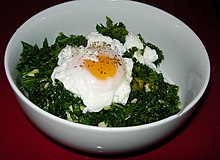
Back نظام غذائي قليل الكربوهيدرات Arabic Нисковъглехидратна диета Bulgarian Dieta baixa en carbohidrats Catalan Nízkosacharidová dieta Czech LCHF Danish Low-Carb German Dieta baja en carbohidratos Spanish رژیم غذایی کم کربوهیدرات Persian Vähähiilihydraattinen ruokavalio Finnish Régime pauvre en glucides French

Low-carbohydrate diets restrict carbohydrate consumption relative to the average diet. Foods high in carbohydrates (e.g., sugar, bread, pasta) are limited, and replaced with foods containing a higher percentage of fat and protein (e.g., meat, poultry, fish, shellfish, eggs, cheese, nuts, and seeds), as well as low carbohydrate foods (e.g. spinach, kale, chard, collards, and other fibrous vegetables).
There is a lack of standardization of how much carbohydrate low-carbohydrate diets must have, and this has complicated research.[1] One definition, from the American Academy of Family Physicians, specifies low-carbohydrate diets as having less than 20% of calories from carbohydrates.[2]
There is no good evidence that low-carbohydrate dieting confers any particular health benefits apart from weight loss, where low-carbohydrate diets achieve outcomes similar to other diets, as weight loss is mainly determined by calorie restriction and adherence.[3]
One form of low-carbohydrate diet called the ketogenic diet was first established as a medical diet for treating epilepsy.[4] It became a popular diet for weight loss through celebrity endorsement, but there is no evidence of any distinctive benefit for this purpose and the diet carries a risk of adverse effects,[4][5] with the British Dietetic Association naming it one of the "top five worst celeb diets to avoid" in 2018.[4]
- ^ Cite error: The named reference
upswas invoked but never defined (see the help page). - ^ Last AR, Wilson SA (June 2006). "Low-carbohydrate diets". American Family Physician. 73 (11): 1942–1948. PMID 16770923. Archived from the original on 13 February 2020. Retrieved 23 February 2010.
- ^ Cite error: The named reference
Thom2017was invoked but never defined (see the help page). - ^ a b c "Top 5 worst celeb diets to avoid in 2018". British Dietetic Association. 7 December 2017. Archived from the original on 6 February 2020. Retrieved 6 February 2020.
The British Dietetic Association (BDA) today revealed its much-anticipated annual list of celebrity diets to avoid in 2018. The line-up this year includes Raw Vegan, Alkaline, Pioppi and Ketogenic diets as well as Katie Price's Nutritional Supplements.
- ^ Kossoff EH, Wang HS (2013). "Dietary therapies for epilepsy" (PDF). Biomedical Journal. 36 (1): 2–8. doi:10.4103/2319-4170.107152. PMID 23515147. Archived from the original on 1 June 2018.
© MMXXIII Rich X Search. We shall prevail. All rights reserved. Rich X Search